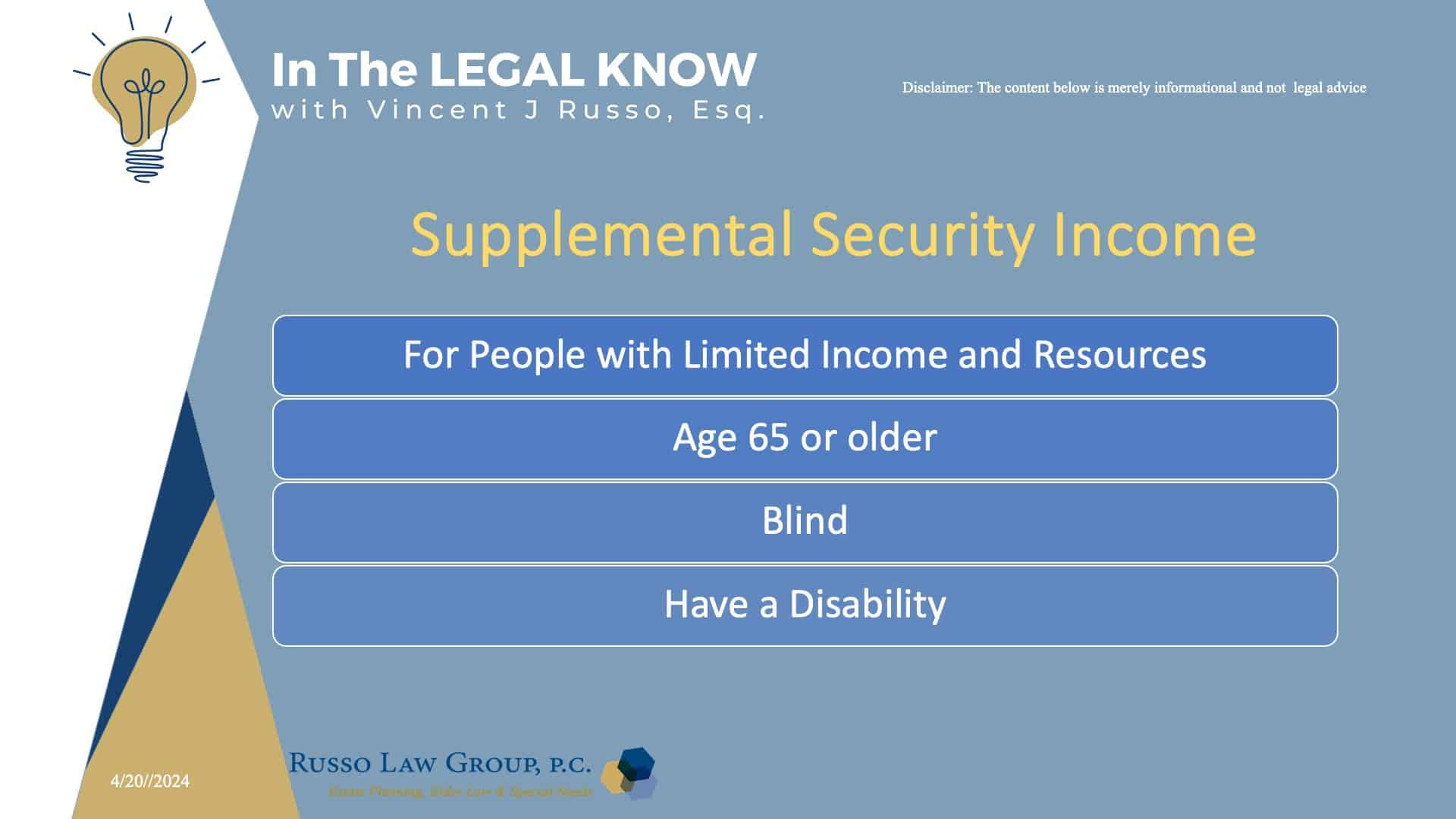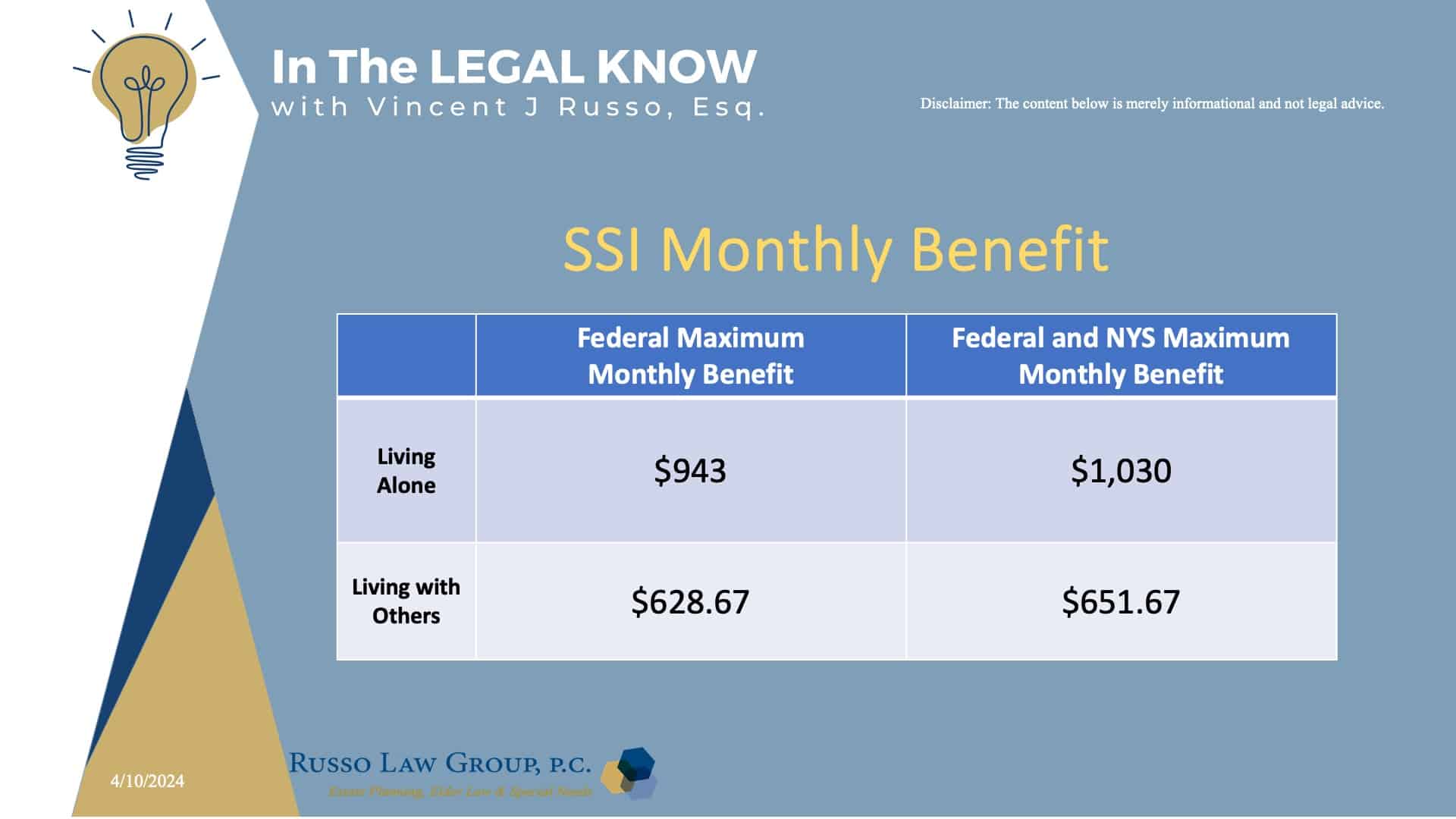Watch “In The Legal Know” with Vincent J. Russo Vincent appeared on CFN Live on…
This originally aired on the Catholic Faith Network’s show CFN Live: https://youtu.be/aQgwbQkJtC0
How can SSI be helpful to parents of children with special needs?
Supplemental Security Income Program (SSI) can be invaluable to parents who have a child with special needs.
The challenges parents face when they have a child with special needs can be overwhelming. But there are a various resources and services that are available to support these parents caring for their child.

Supplemental Security Income (SSI) is a Social Security Benefit for people with limited income and resources who are sixty-five or older, blind or have a disability.
How can a parent determine if their child qualifies for SSI?
 There are two parts for determining eligibility. The First part is the child must be determined “disabled” under the Social Security rules. If your child is under age 18, then the child is considered disabled if the child has:
There are two parts for determining eligibility. The First part is the child must be determined “disabled” under the Social Security rules. If your child is under age 18, then the child is considered disabled if the child has:
- A physical or mental impairment or combination of impairments
- Impairments which cause severe limitations in your daily life, and
- A condition that has lasted or is expected to last for at least 12 months.
The Second part is the child has to financially qualify. If the child is under age 18, then the income and assets of the child and the parents must not exceed certain financial limits. If the child is 18 years of age or older, then the parents’ assets and income are not considered as to eligibility.
How much can a child receive from SSI?
If the child is eligible for SSI, there is a monthly stipend to help pay for living expenses.The amount will depend upon the state the child lives in and the household setting.
An additional cash benefit is also supplied by the State (except for Arizona, Mississippi, North Dakota, and West Virginia).
The Maximum Federal SSI Benefit is $943 plus the state supplement. For example, in NYS the monthly additional supplement can be up to $87 when living in the community, bringing the monthly SSI benefit to $1,030.
There is a one-third reduction due to the in-kind support and maintenance (ISM) rule which can reduce the SSI benefit by up to one-third. The Federal maximum monthly benefit can then be reduced to $628.67.
If housing is provided to the child and no rent is paid, then there is this one-third reduction.
There is good news that the reduction for food under the in-kind support and maintenance rule will be eliminated beginning September 30, 2024.
Under the final rule, beginning September 30, 2024, the Social Security agency will no longer include food in ISM calculations. The new policy removes a critical barrier for SSI eligibility due to an applicant’s or recipient’s receipt of informal food assistance from friends, family, and community networks of support.
The new policy further helps in several important ways: the change is easier to understand and use by applicants, recipients, and agency employees; applicants and recipients have less information to report about food assistance received from family and friends, removing a significant source of burden; reducing month-to-month variability in payment amounts will improve payment accuracy; and the agency will see administrative savings because less time will be spent administering food ISM.
Why is age 18 important in qualifying for SSI benefits?
At age 18, there is no parental deeming which means that the parents’ assets and income are not considered in determining financial eligibility for the parent’s child.
The financial determination is based solely on the assets and income owned by the child who is age 18 or older. The child must have less than $2,000 in the child’s name. This is an opportunity for the parents to obtain a necessary benefit for their child.
It is important that the parents consider any and all assets that are in the child’s name before applying for SSI. Planning may be required in order to qualify.
How does my child on SSI qualify for Medicaid Benefits?
In many states, once the child qualifies for SSI, then the child is automatically eligible for Medicaid. In some states, your SSI guarantees you Medicaid eligibility, but you must sign up for it. In a few states, SSI does not guarantee Medicaid eligibility. But most people who get SSI are still eligible.
Medicaid can always be applied for separately as well.
SSI is a complicated program and can be overwhelming for parents who are caring for a child with special needs. For more information, CLICK HERE to download our complimentary Special Needs Planning Guide.
We hope you found this article helpful. Contact our office today at 1 (800) 680-1717 and schedule an appointment to discuss what makes sense for you and your loved ones.





Comments (0)